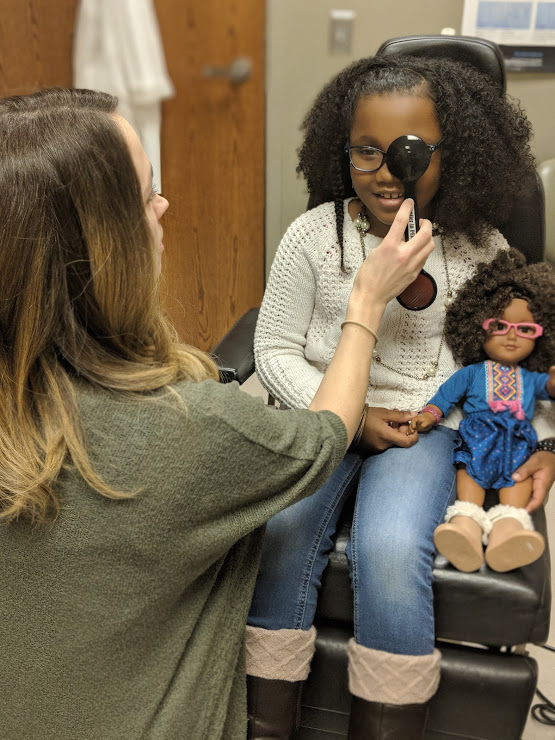The UAB School of Optometry’s pediatric eye clinic was named the November Pediatric Eye Disease Investigator Group (PEDIG) site of the month for recruiting the highest number of pediatric patients for clinical trials. The studies, being conducted in partnership with the National Institutes of Health (NIH), Optometry and Ophthalmology, focus on conditions like lazy eye, eye turns and myopia.
PEDIG is a collaborative network dedicated to facilitating multicenter clinical research in strabismus, amblyopia and other eye disorders that affect children. The network, which was formed in 1997, is funded by the National Eye Institute (NEI). The NEI is a part of the National Institutes of Health, which is the branch of government that funds medical research. There are currently over 100 participating sites (offices) with over 300 pediatric ophthalmologists and pediatric optometrists in the United States, Canada and the United Kingdom participating in the network.
“Here at UABSO we strive to provide collaborative, evidence-based pediatric eye care and we dedicate all of our efforts to making sure that all have a great experience when they are in our care,” said Dr. Kathy Weise. “Participating in federally funded research helps us care for our patients with the very latest in treatment options. It is an honor for us to be recognized for the 4th time as the site of the month.”
The three PEDIG studies for which UABSO is successfully recruiting are:
ATS20 – Binocular Dig Rush Game Treatment for Amblyopia is a study used to compare the efficacy of 1 hour/day of binocular game play 5 days per week plus spectacle correction with spectacle correction only, for treatment of amblyopia in children 4 to <13 years of age.
IXT5 – A Randomized Clinical Trial of Overminus Spectacle Therapy for Intermittent Exotropia conducts a randomized trial comparing 2.50D overminus lens treatment vs. non-overminus (spectacles without overminus or no spectacles) to determine the efficacy of overminus lenses after 12 months of treatment.
MTS1 – Low-Dose Atropine for Treatment of Myopia is a study that was done to determine the efficacy of daily low-dose atropine (0.01%) for slowing myopia progression over a two-year treatment period in children aged 5 to less than 13 years with myopia -1.00 to -6.00D at the time of enrollment (Primary Outcome On-Treatment). It also helps to determine the efficacy of atropine treatment on myopia progression 6 months following cessation of low-dose atropine treatment (Secondary Outcome Off-Treatment). Dr. Weise is the national protocol co-chair with Mike Repka, MD (Johns Hopkins). Among ten sites across the US, UAB Optometry is tied for first in participant recruitment.
In 2017, during PEDIG’s 20th year of NIH funding and amid the company of other medical universities and institutions that include Emory, Mayo, Johns Hopkins and Vanderbilt, UAB was recognized as the 9th highest nationally in recruitment . UAB has helped PEDIG publish over 100 research articles that help doctors help children all over the world.
The UAB pediatric eye care team who works closely to conduct these federally funded studies include Dr. Kristine Hopkins (site PI), Dr. Ann Marie Arciniegas-Bernal, Dr. Jennifer Davidson, Dr. Marcela Frazier, Dr. Sarah Lee, Dr. Tamara Oechslin, Dr. Candice Turner, Dr. Kathy Weise, and Jenifer Montejo. Both PEDIG and UAB highlight how the deliberate collaboration between optometry and ophthalmology can provide national recognition for helping children locally.
